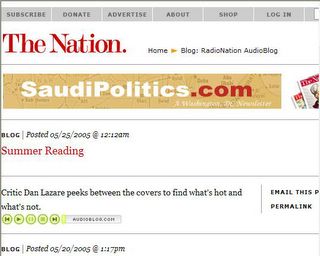Audio Blogs - Podcasting
Blogs are not limited to sharing words and text. Blog sites now also routinely share audio files, including telephone messages, voices and music. Terms like audioblogging, audblog and more recently podcasting have been coined to describe a new form of radio station, an online on-demand source of audio (Google search for audio blog). The term Webjay has replaced DJ as the person who selects the audio files to be shared at a given web site. The growth in the number of people in the U.S. using computers to listen to radio has grown to over 50 million people, showing 18% growth in 2005 while traditional radio listenership, though huge, fell 4% (Hesseldahl, 2005), a total hovering around 200 million people each day. Experience an audio blog by putting headphones on or crank up your speaker volume. Click the listen button at NPR or click the image of the audioblog site from The Nation site below.

Click image for larger display.
Audio blogs are creating a new form of radio. The term podcasting (Wikipedia.org, 2005) was coined to describe the process of going one step further and using blog sites to send web-based audio files to Apple Computer's ubiquitous player of mp3 files, iTunes, and then passing these files on to their portable player, the iPod. This way, the listener could download and listen anywhere to a wide variety of audio files from music to specialty news, corporate reports, lectures, comedy and other entertainment shows. Making an audio file be heard on a web page, an audio blog, is easy. Getting that audio file to automatically download through syndication for playing requires RSS 2.0 coding, sometimes referred to as a wrapper. This takes another step or two beyond just saving the audio file.
Podcasting has quickly moved from amateur experiments to marketplace impact (Nesbitt, 2005). On June 28, 2005 Apple made version 4.9 of iTunes available for download that included audio feeds via RSS syndication. In the first two days after it was made available, their iTunes audio play system logged over 1 million podcasts downloaded out of a pool of just 3,000 files (Podcasting News, 2005). Thousands more are still available.
The podcast term later took on a more generic meaning. Podcasting now refers to moving audio files to any portable digital audio player or to any computer and cell phone player capable of downloading and playing audio files. A podcast is then any audio composition created and made available for Internet sharing using blogs and other Internet communication forms. Users can register or subscribe to the postings of many blog sites, and very quickly receive the files or receive notice of the availability of the podcasts. This subscription process, called syndication, will be described in greater detail below. Sequenced in whatever fashion listeners would like on their own hard drives, each user becomes the organizer of their own personal radio collection.
The collection of sites offering podcast syndication of their content is diverse and significant. It includes major radio broadcasters, TV network broadcasters, major newspapers, and more. A partial list of major providers of podcasts as of May, 2005 included Clear Channel, NPR, Rush Limbaugh, ESPN, ABC News, NBC News, TV Guide, Sundance, BBC, Yahoo, Newsweek, BusinessWeek, Forbes, Washington Post, Denver Post, Seattle Post, San Francisco Chronicle, Disney, Warner Bros. Pictures, Ford, General Motors, Proctor & Gamble, and General Motors.
A rush of companies has emerged providing a variety of audio blogging and podcasting services. These include: [free] Telcaster (& article); AudioBlogger but need SmartCast to put audio files in RSS enclosures for syndication; Odeo (which can talk the talk of online creation but not walk the walk yet, their blog & screenshots); [fee] BlogMatrix Sparks!; Liberated Syndication ; slapcast.com; AudioBlog; [tools] EasyPodcast ; Poderator; MixCast Live; CastBlaster ($50); Podcastrigs Forum; DopplerRadio. Expect further rapid growth of such options.
Standard tower based radio stations have taken notice of the availability of the thousands of these podcasts. As an example of the appeal of the podcasting format, Infinity Broadcasting, a radio operator of more than 180 stations in the United States, has converted its San Francisco AM station, 1550 KYCY, to the world's first all-podcast format as of May, 2005 (Jardin, 2005, May). The station requests and screens digital audio files from their broadcast and Internet audience and plays them. It also makes these compositions available for download from their web pages KYOURadio.com. The satellite radio service called Sirius is also offering a podcasting channel. Your podcast might be playing on someone's car radio.
Always wanted to have your own radio station? This required some "out of the box" thinking from net innovators but it now works. By thinking about audio distribution in a new way, blogging makes it not only possible but easy for entities and individuals to leverage both the concept and the power of radio in a way to fit their budget.


0 Comments:
Post a Comment
<< Home